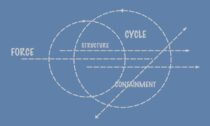We are having an intimate holiday season with food, family, and small adventures along the Oregon coast. There were hints of Christmas with presents and music, as well as new Yule poetry that celebrates the cycles of the ocean in a natural dialogue with the seasonal flow: “King tides pull the world upward / … / Whales coast through gabled waters…” And then there are the swirling culture wars out there somewhere trying to deny us our diverse ideas and new traditions. We don’t worry much about their misdirection, but find the lack of creativity disheartening. Why not learn and invent new ways of thinking about society and culture?
Rabbi David Wolpe at Harvard Divinity has a more historical and intellectualized take on modern life in the Atlantic where he tries to collapse all the complexity of modern political instincts into an amalgam about insufficient humility about our own ideas and capabilities. I like critiquing these kinds of intellectual histories because I am humble enough to doubt that singular ideas can explain all the myriad ways of flourishing in human history. “The Return of the Pagans” maps the contemporary left with their environmental worship—and the right with heroic icons like Donald Trump—to something like the Greco-Roman idolization of beauty, power, wealth, and creativity. It is the invention of monotheism that focused the ancient mind on a singular divinity that we poor humans can always prostrate our tiny plans before. Elon Musk shouldn’t strain to get to Mars. Tech Bros shouldn’t accelerate technological change without deep humility about the impact on society. The ultra-wealthy used to be more concerned for using their wealth for good. Everyone should instead contemplate their imperfect sin-nature in the face of perfection.… Read the rest








